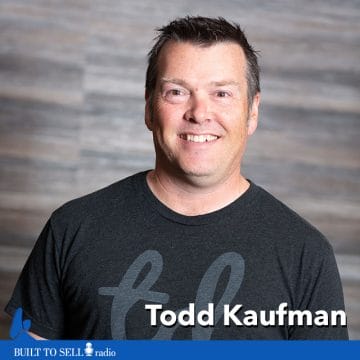About this episode
Todd Kaufman and his partner Justin Searls started Test Double, a custom software development company, in 2011. The business was a success from the start and grew more than 25% a year. By 2019, Kaufman and Searls were generating more than $10 million in annual revenue and putting more than $3 million to the bottom line each year. An outside valuation consultant suggested if they ever wanted to sell, Kaufman and Searls could get around 6.5 times profit for their business or around $20 million.
That’s when the partners had a realization. Given the value of the company they had built and the fact they had been able to pull out profits along the way, the partners had already been rewarded for the risk they had taken in starting Test Double. Kaufman and Searls reasoned it was now time for their employees to benefit from the next stage of Test Double’s growth. Kaufman and Searls decided to sell their shares into an Employee Stock Ownership Plan (ESOP). They agreed to sell their shares to their company (which transferred the shares into the ESOP) for $23 million, which the company paid by taking out a loan for 20% and getting Kaufman and Searls to loan the business the rest. Now the company takes its profits and pays down its debt to the bank and the founders.
It’s a complex sale structure, but one Kaufman speaks passionately about, as you’ll hear in the episode. Listen now and discover:
- The mechanics of how an ESOP works.
- The pros and cons of an ESOP.
- Benchmarks for when an ESOP might make sense (and when it doesn’t).
- The surprising upside of being a “lifestyle business.”
- Why Kaufman got concerned when their profit margin surpassed 25%.
- A definition of Discounted Cash Flow (DCF).
- Why so many founders suffer from “owner’s guilt.”
- How to get a bank to loan your service company money (without signing a personal guarantee).
- The 15% rule and how it impacts the value of your business.
- The unexpected downside of open-book management.
- What interest rate replacement warrants are and how they can contribute to your take from the sale of your company.
Check out our article on The Unspoken Downside Of Building To Sell.

About Our Guest
Todd Kaufman has developed a lifelong passion for software. Graduating from The Ohio State University in 1998, Todd began working professionally as a software developer. As he gained experience via product companies and consultancies, Todd was able to expand his impact as a software developer, technical architect, and agile coach. The experiences eventually led him to co-founding Test Double in 2011, a consultancy focused on improving the broken industry of software development.
Test Double’s focus on hiring highly communicative, creative, and adaptable software consultants has led to rapid and sustainable growth over the last nine years. From two consultants in 2011 and $10k in revenue, the company has expanded to over 60 billable consultants and more than $14M in revenue in 2020, earning Test Double a spot on the Inc 5000 five years in a row. The company has recently completed a transition into a 100% ESOP owned business, resulting in the value of this rapidly growing being shared across all eligible employees and providing a non-disruptive path for exit when the time is right for the owners. Twitter: @toddkaufman. LinkedIn: https://www.linkedin.com/in/testdoubletodd/


